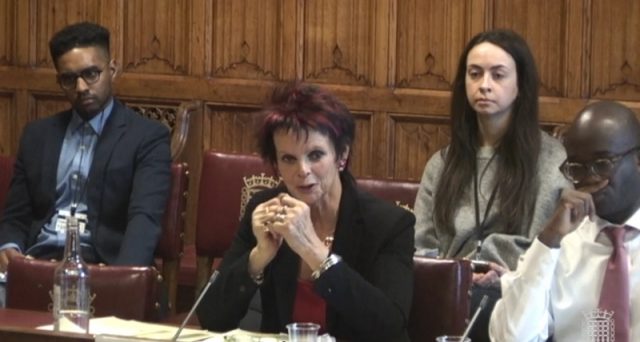Fears that university-goers will choose to do apprenticeships instead and “squeeze out” those from disadvantaged backgrounds are still rife in Whitehall, the skills minister has said.
Gillian Keegan told the House of Commons education select committee this displacement is a particular worry when it comes to degree apprenticeships.
Her concern comes three years after her predecessor Anne Milton admitted that fears of a “middle-class grab” on apprenticeships are “valid” following a steep rise in starts at degree levels while the lower levels dropped off.

Keegan’s comments also come as the government prepares to launch a consultation on the future of degree apprenticeships.
After being asked how she plans to boost degree apprenticeships, Keegan told MPs today: “There is a growth in degree apprenticeships, but the very important point is how we make them more accessible to more disadvantaged groups.
“What we are fearful of is that a lot of people will suddenly see that degree apprenticeships are a very good option and people who would have gone to university anyway would just choose that route and squeeze out people like me, sat in a comprehensive school at 16, with nowhere to go thinking ‘how do I get on in life?’.”
Degree apprenticeships were first launched in September 2015 and have soared in popularity.
FE Week analysis of official Department for Education data shows starts at level 4 and above have increased threefold and gone from 4 per cent to 26 per cent of all starts since then.
At the same time level 2 has shrunk from accounting for 60 per cent of all starts in 2014/15 to just 31 per cent in 2019/20.
‘You often get unintended consequences when government intervenes’
Education select committee chair Robert Halfon pressed Keegan on what her department could do to increase the take-up of degree apprenticeships even further, but the skills minister warned of “unintended consequences” that could come with any tinkering.
“Many employers are switching from graduate programmes to degree apprenticeships because they have seen they get better results. You quite often get unintended consequences when the government intervenes in various bits of this system,” Keegan said.
“This is about getting a system that transforms technical education in this country, that makes sure it is accessible to everybody no matter where they are in the country, no matter their background, no matter their ethnicity and whatever their journey is.”

















I find the comments outlined in the article difficult to comprehend given successive governments failure to ensure that 15 year olds get the chance to be given impartial and informed careers advice and access to related work experience (not schools making do with whatever they can get). These two things would give many 16 year olds informed choice of whether to stay at school (where that route is only really focused on A levels and preparation for university) or enter the world of work through apprenticeships. My own children had horrendous careers advice but both undertook apprenticeships and are doing well. So many of their peers undertook degrees and are now not doing anything related to them. Far too many youngsters go to HE because of school and parental pressure and the sales pitch of the ‘university experience’. The number of apprenticeships available rather than the children of the better off going for them is the reality of the situation. The Richards Review and subsequent levy has been a disaster for social mobility and take up of apprenticeship employment by SMEs. The use of apprenticeships within government itself has also not been a role model to large and small business with many advanced apprentices having started at 18 with three A levels, rather than reasonable GCSEs at 16. It is pretty simple to get right if you ask the right people rather than ivory tower academics who know very little about apprenticeships besides what they have read. Ask your advisers what their own backgrounds are and how they will gather you evidence about apprenticeships.
This was the obvious problem from the start. David Cameron made statements about not going to university with debt when you can get a degree for free through an apprenticeship. As Levy paying employers look to ‘get their money back’ they are often turning to degree apprentices and in many cases reducing their offer at lower levels.
The other simple fact is that just as the unintended consequence of the 50% to university policy of Blair resulted in more graduates than were needed so they became a sift mechanism whereby graduates took jobs that were previously done by A Level and equiv applicants, degree apprenticeships are doing the same. In the end, those at the bottom of the ladder who really want and need opportunity are the ones who lose out.
Higher and degree apprenticeships have a key role to play in enhancing social mobility but the measures currently used to indicate social mobility are highly misleading and not fit for purpose. After having conducted research regarding the socio-economic backgrounds of over 1,000 apprentices at Middlesex University we have found that the differences between generalised geographical measures such as POLAR and IMD, when compared with our own data, are stark. For example, we found that 66% of Middlesex apprentices are from socio-economic backgrounds where their parents have no experience of higher education. POLAR data on levels of HE participation indicated that only 28% of the same apprentices were from low HE participation areas. The Middlesex ‘Move on Up’ study really shines a light on the inadequacies of measures such as POLAR and IMD when considering how apprenticeships contribute to social mobility or ‘levelling-up’. The Middlesex University study clearly shows that higher and degree apprenticeships are making a very significant contribution to social mobility and transforming the lives of apprentices by enabling them to access professional careers. This should be celebrated. The Move on Up study can be found here: https://www.mdx.ac.uk/__data/assets/pdf_file/0022/600583/MDX_Move-on-Up_Early-findings_For-screen_AW.pdf
It was written on the wall that degree apprenticeships would soar in popularity, as soon as the funding bands were published and apprenticeship funding was ‘gobbled up’ by the extraordinary high funding band attached to them (up to £27K!! in some sectors). The levy introduced at the same time employers then shifted their focus to rebadging management training to the funded £9K management apprenticeships – any idiot with half a brain could see what was going to happen! Hence massive increase in Level 5 management starts and then the demise of level 2 apprenticeships as funding slashed with lower funding bands (child care funding band £3K, L2 24 month programmes in hairdressing slashed from £9k to £7k in less than 2 years not to mention L2 business admin fiasco!!) not even worth delivering as a provider as these new standards are much higher levels so costs for delivery increase then the addition of EPA costs then soared too from L2 Hair £270 per student to L3 £650 per student (L3 Hair only gets £5K funding). Traditional level 2 apprenticeships have been drowned out with poor funding bands. WE are constantly drilled on quality delivery but with less funding than frameworks by the time you take all the extra delivery costs of the of the equation. Again academic and professors getting involved in consultations and making recommendations, government continue to put their trust in the wrong people who do not work in the apprenticeship market place and have no clue. But if you ask any training provider they would have predicted this ‘perfect storm’ and speared you this 2 years ago!!
You are not going to get the so called ‘parity of esteem’ between academic and technical education if you bring ‘class’ into the argument.
By raising fears of a middle class grab it reinforces the notion that Technical is lower class, & Academic is middle class – i.e. is divisive.
The way I see it, Levy was introduced as an accounting trick to get some public expenditure of the books, transferring the financial liability to large business. Broadly speaking, large business adapted by converting their existing staff development spend into apprenticeships, which; pumped up starts in higher levels, at the expense lower levels, more existing staff employed as apprentices at the expense of new and more older apprentices at the expense of younger.
Using the ‘class’ argument is an attempt to lay the blame on the people, for a decision made by Government and enacted by business behaviour.